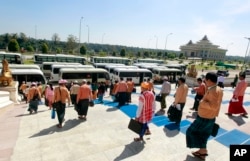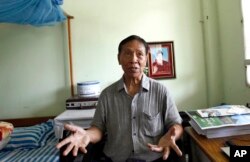Government officials do not typically enjoy a positive reputation in Myanmar, and reform efforts have been sluggish since the country began moving toward democracy.
Decades of rule by a military junta that did not regard itself as accountable to the general public have created a legacy of distrust. But successive governments since 2011 — the first to be democratically elected in 50 years — have initiated some limited reforms aimed at improving trust and making the country's public sector more efficient.
One of the first acknowledgments of the issue from the government came in December 2012, when then-president Thein Sein made a speech criticizing government officials for arrogance, corruption and incompetence.
His government went on to make some progress in reforms, decentralizing some decision making to states and regions, as well as ending the monopoly on telecommunications services held by the Ministry of Communications and Information Technology.
Continued efforts
Since coming to power in 2016, the National League for Democracy has tried to continue those reforms.
In its pre-election manifesto, the party promised to install a government that "will fairly and justly defend the people." It promised to reduce the number of ministries to cut spending, work to tackle corruption, and amend and enact legislation "for the benefit of the people."
President Win Myint, who was elevated to his role in March, has urged the government to continue reforms in this area.
"Administrations should not become machines that oppress," he said last week at an event to support people displaced by recent flooding. "Human rights must be protected, and administrations must safeguard and protect the freedom and security of the people. It is required that they be responsible, dutiful, transparent, cooperative and display foresight."
Capacity issues
Despite the political will for reform in this area, the government still faces major challenges in a country where the concept of electable, accountable officials is only a few years old.
"People are frustrated by the lack of capacity," Yee Mon Hsu, executive director of think tank National Enlightenment Institute, told VOA.
"There are some government officials who use this as an excuse if they don't want to do something," she said. "At the same time, there are brilliant government officials who are working to try and improve their respective departments — and have pointed out what needs to be improved."
As an example, she pointed to Soe Thane, who was Minister for Industry under the previous administration, who she said eased restrictions on Small and Medium Enterprises operating in the country by improving their capacity and increasing access to funds.
"But now I think motivation in that department is quite low," she said.
Naing Ko Ko, who is researching a Ph.D. about corruption in Myanmar's public sector, said the NLD had made progress in some areas, and was actively trying to promote ethical leadership among government officials.
In November, the government formed a new Anti-Corruption Commission, and a few months later the then-minister for national planning and finance, Kyaw Win, resigned after it emerged he was being investigated for corruption.
Naing Ko Ko said this was a "visible sign of reform" in this area. However, he acknowledged the capacity to implement reforms remains an issue.
"This administration has implemented a public-sector reform program, but implementation is a big problem. They have the program, but implementing it is a problem, due to lack of capacity," he said.
NLD government officials could not be reached for comment.
More reform needed
Some analysts have been critical of the public-sector reforms under the NLD government, however.
Soe Myint Aung, founder of the Yangon Center for Independent Research, said Myanmar citizens have seen little change in the public system since the party came to power.
He acknowledged the party had been consumed by other problems, notably the crisis in Rakhine state, natural disasters in the form of flooding, and the peace process, but said more urgency was required.
Soe Myint Aung said it would take more than one commission to deal with the deeply-embedded issue of corruption in the country's public service.
"It needs cooperation among many different players, including the business owners as well as the civil society," he said. "You need to increase [public servants'] salaries in order to curb corruption. These are long-term goals, and they cannot be done without planning and being strategic."






